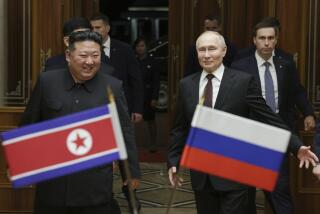In Retrospect Korea Was Well Worth It : First War the U.S. ‘Lost’ Was Not a Losing Cause
- Share via
Forty years ago communist North Korea’s tanks and troops struck across the thinly defended border at the 38th Parallel, sliced through poorly equipped South Korean forces, captured the capital, Seoul, and stood poised to reunite through aggression the ancient land that World War II had left physically and politically divided.
North Korean dictator Kim Il Sung anticipated a quick march to triumph. What his invasion instead produced was 37 months of war that consumed millions of lives, transformed the U.S.-Soviet competition from an ideological into an armed confrontation, and shaped official American attitudes and policies for a generation to come.
From the perspective of passing years the Korean conflict--and specifically the U.S. decision to intervene there--can now be seen as a watershed in the Cold War. Today, Kim Il Sung remains North Korea’s undisputed and implacable master, the object of a personality cult that even Stalin might have turned away from in disgust. Soon he will seek to inaugurate the communist world’s first dynasty when he passes power to his son. Nothing else, though, including the U.S.-Soviet Cold War, remains as it was.
South Korea has become one of the world’s major economic success stories, a leading trading nation whose people enjoy a steadily rising standard of living. No less important, it has evolved politically from the autocracy of Syngman Rhee in the 1950s through a succession of authoritarian military-based regimes to today’s freely chosen government and emerging, if not fully formed, democratic institutions.
All this was bought 40 years ago at great cost. South Koreans suffered terribly in lives lost, in families sundered and in relentless physical destruction. Americans sent to help them resist aggression paid heavily as well. More than 54,000 died in Korea--nearly as many as would later die in eight years of fighting in Indochina. About 8,000 remain “missing in action,” nearly four times as many as in Vietnam.
Despite this toll, Korea soon became the forgotten war. For a brief time it aroused domestic political passions, a mood that largely passed after the 1952 elections. When an armistice finally halted the fighting in July, 1953, most Americans were eager to put the war as far from mind as possible. Only in the last few years has thought even been given to providing a memorial in Washington for those who fought and bled and died in Korea.
Some still complain that Korea was the first war the United States failed to win. But that lingering frustration reflects less on what happened in the Korean War than what happened 20 years later in Vietnam. Certainly, it is unlikely U.S. policy-makers would have chosen to intervene in Indochina, and then wage the war as they did, if they had not feared a Chinese intervention like that which prolonged the Korean conflict.
But later misjudgments should not be allowed to obscure what determined resistance to aggression accomplished in Korea. Thanks to the sacrifices of Koreans, Americans and others fighting under the U.N. flag, an invasion was repelled and South Korea was given the chance to evolve toward freedom. Perhaps most important, not least for Western Europe, clear notice was served that cross-border aggression would be resisted and repelled.
These were not insignificant accomplishments. Four decades after the onset of a harsh and costly war, these achievements and those who fought to bring them about deserve to be recognized and honored.
More to Read
Sign up for Essential California
The most important California stories and recommendations in your inbox every morning.
You may occasionally receive promotional content from the Los Angeles Times.













